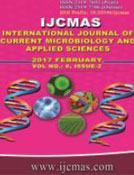


 National Academy of Agricultural Sciences (NAAS)
National Academy of Agricultural Sciences (NAAS)

|
PRINT ISSN : 2319-7692
Online ISSN : 2319-7706 Issues : 12 per year Publisher : Excellent Publishers Email : editorijcmas@gmail.com / submit@ijcmas.com Editor-in-chief: Dr.M.Prakash Index Copernicus ICV 2018: 95.39 NAAS RATING 2020: 5.38 |
The survivability of the dietary culture in the presence of acid and bile salts during the passage through the gastro-intestinal tract is the pre-requisite for probiotics to function in the intestine. While the spore-forming Bacillus strains have created enormous interest as probiotics in human as well as livestock animals in the recent years, intrinsic functional properties for screening probiotics such as resistance to acid, tolerance to bile salt, cell surface hydrophobicity and rate of acid production were studied with 47 spore-forming Bacillus isolates collected from milk, soil and tomato sources. Among 47 Bacillus isolates, isolate B9 appeared to be the most acid tolerant, surviving even after 3 h at pH 1.0. Isolate B37 showed the highest tolerance to 2.0% bile salt concentration up to 12th h followed by B48, P3 and B9. Isolate T15 showed the highest adherence ability (48.43%), followed by isolate B37 (42.88%) and isolate B9 (37.43%). Bacillus isolates collected from tomato sources have shown to produce lactic acid at the level between 0.98 and 1.23%. Based on multivariate principal component analysis (PCA) with a varimax procedure of factor analysis and weighted linear scoring on the minimum data set (MDS) of variables, first ten Bacillus isolates were ranked for the functional properties of probiotics.
 |
 |
 |
 |
 |